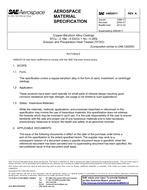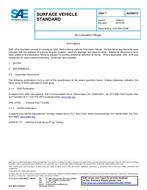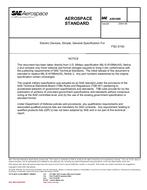Click here to purchase
The parameters measured according to this SAE Recommended practice will generally be used in simulating directional control performance in the linear range. (The “linear range” is the steady-state lateral acceleration below which steering wheel angle can generally be considered to be linearly related to lateral acceleration.) But they may be used for certain other simulations (such as primary ride motions), vehicle and suspension characterization and comparison, suspension development and optimization, and processing of road test data.This document is intended to apply to passenger cars, light trucks, and on-highway recreational and commercial vehicles, both non-articulated and articulated. Measurement techniques are intended to apply to these vehicles, with alterations primarily in the scale of facilities required. but some differences do exist between passenger cars and trucks, especially heavy trucks, such as differences in body/frame flexibility, suspension stiffness, and suspension friction. These will be addressed in this document or SAE J1574-2, where appropriate.
Product Details
- Published:
- 10/05/2012
- File Size:
- 1 file , 650 KB


